Fleurs du Mal Magazine


Or see the index

John Donne
(1572-1631)
Song: Go and catch a falling star
Goe, and catche a falling starre,
Get with child a mandrake roote,
Tell me, where all past yeares are,
Or who cleft the Divels foot,
Teach me to heare Mermaides singing,
Or to keep off envies stinging,
And find
What winde
Serves to advance an honest minde.
If thou beest borne to strange sights,
Things invisible to see,
Ride ten thousand daies and nights,
Till age snow white haires on thee,
Thou, when thou retorn’st, wilt tell me
All strange wonders that befell thee,
And sweare
No where
Loves a woman true, and faire.
If thou findst one, let mee know,
Such a Pilgrimage were sweet;
Yet doe not, I would not goe,
Though at next doore wee might meet,
Though shee were true, when you met her,
And last, till you write your letter,
Yet shee
Will bee
False, ere I come, to two, or three.
John Donne poetry
fleursdumal.nl magazine
More in: Archive C-D, Donne, John
Bert
BEVERS
Picknick in Picardië
In de bossen rond Compiègne
dronk ik bier en brak ik brood.
Elke rust kwam over mij,
zo bloot als mijn gedachten waren
en ik genoot van alle dagen,
alle nachten die ons nog
te wachten staan. Van al die
bomen, al dat gras en
al die struiken bedacht ik geen
geschiedenis: ik liet ze ruiken
naar wat nog voor te vallen is.
Van mensenheugenis was niets te merken.
Bert Bevers
(Verschenen in De Tweede Ronde, Amsterdam, 8e jaargang, nummer 4)
fleursdumal.nl magazine
More in: Archive A-B, Bevers, Bert
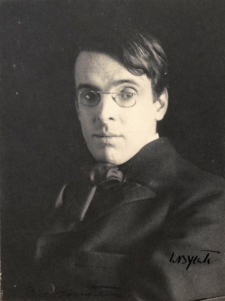
William Butler Yeats
(1865-1939)
The Folly Of Being Comforted
One that is ever kind said yesterday
‘Your well-beloved’s hair has threads of grey,
And little shadows come about her eyes;
Time can but make it easier to be wise
Though now it seems impossible, and so
Patience is all that you have need of.’ No,
I have not a crumb of comfort, not a grain;
Time can but make her beauty over again;
Because of that great nobleness of hers
The fire that stirs about her, when she stirs
Burns but more clearly. O she had not these ways,
When all the wild summer was in her gaze.
O heart! O heart! if she’d but turn her head,
You’d know the folly of being comforted.
William Butler Yeats poetry
fleursdumal.nl magazine
More in: Archive Y-Z, Yeats, William Butler
 Dichter Martin Beversluis viert in 2015 zijn 20-jarig jubileum, en trapt op gedichtendag zijn jubileumjaar af met de presentatie van zijn minibundel ‘De liefde begonnen’. De minibundel bestaat uit 9 gedichten op muziek. Evelien van Breemen verzorgde de vormgeving en Tom Pijnenburg maakte bij één van de gedichten een video. ‘De liefde begonnen’ is vanaf gedichtendag gratis te downloaden via www.beversluis.com en via www.telexpress.nl. De presentatie vindt plaats tijdens Beyond Borders: gedichtendag in de Polygonale Loods aan de Burgemeester Brokxlaan in Tilburg. De toegang is gratis.
Dichter Martin Beversluis viert in 2015 zijn 20-jarig jubileum, en trapt op gedichtendag zijn jubileumjaar af met de presentatie van zijn minibundel ‘De liefde begonnen’. De minibundel bestaat uit 9 gedichten op muziek. Evelien van Breemen verzorgde de vormgeving en Tom Pijnenburg maakte bij één van de gedichten een video. ‘De liefde begonnen’ is vanaf gedichtendag gratis te downloaden via www.beversluis.com en via www.telexpress.nl. De presentatie vindt plaats tijdens Beyond Borders: gedichtendag in de Polygonale Loods aan de Burgemeester Brokxlaan in Tilburg. De toegang is gratis.
‘De liefde begonnen’ bestaat uit oud en nieuw werk. De titel refereert aan het motto van gedichtenweek 2015: ‘Met zingen is de liefde begonnen’. De muziek nam de dichter eind 2014 thuis op. Daarbij werkte Martin Beversluis samen met muzikant Jeroen Geurts. Komend najaar zal er nog een dichtbundel van Martin Beversluis verschijnen. Die bundel gaat ‘Meandertaler‘ heten en komt in september 2015 uit bij Uitgeverij teleXpress.
Al voor de publicatie van ‘De liefde begonnen‘ vervolgt Martin Beversluis zijn eeuwigdurende ‘Consumptiebonnentour’ met optredens op de meest uiteenlopende Nederlandse en voor het eerst ook Belgische podia. Zo staat hij op 24 januari in Café Lambiek tijdens het Red De Pollepel Festival, op 25 januari schuift Martin aan bij het Cultureel Café in De NWE Vorst en op 7 februari treedt hij op in Turnhout bij De Sprekende Ezels. Daarnaast blijft Beversluis actief als organisator en presentator van de Tilburgse poetry slam Podiumvlees (samen met Daan Taks) en van Beyond Borders: Poëzie Polygonaal. En Martin Beversluis gaat uiteraard nog meer activiteiten in het kader van zijn jubileumjaar organiseren.
Daarvan kunt u op de hoogte blijven via zijn website en zijn facebookpagina (én fleursdumal.nl magazine).
fleursdumal.nl magazine
More in: - Book News, Archive A-B, Art & Literature News, Beversluis, Martin, Poetry Slam
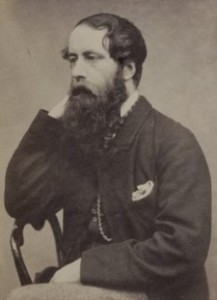
Arthur Munby
(1828-1910)
Post Mortem
I lay in my coffin under the sod;
But the rooks they caw’d, and the sheep they trod
And munch’d and bleated, and made such a noise–
What with the feet of the charity boys
Trampling over the old grave-stones–
That it loosen’d my inarticulate bones,
And chased my sleep away.
So I turn’d (for the coffin is not so full
As it was, you know) my aching skull;
And said to my wife–and it’s not my fault
If she does lie next to me in the vault–
Said to her kindly, “My love, my dear,
How do you like these sounds we hear
Over our heads to-day?”
My wife had always a good strong voice;
But I’m not so sure that I did rejoice
When I found it as strong as it used to be,
And so unexpectedly close to me:
I thought, if her temper should set in,
Why, the boards between us are very thin,
And whenever the bearers come one by one
To deposit the corpse of my eldest son,
Who is spending the earnings of his papa
With such sumptuous ease and such great eclat,
They may think it more pleasant, perhaps, than I did,
To find that in death we were not divided.
However, I trusted to time and the worms;
And I kept myself to the mildest terms
Of a conjugal “How d’ye do.”
“John,” said my wife, “you’re a Body, like me;
At least if you ain’t, why you ought to be;
And I really don’t think, when I reflect,
That I ought to pay as much respect
To a rattling prattling skeleton
As I did to a man of sixteen stone.
However” (says she), “I shall just remark
That this here place is so cool and dark,
I’m certain sure, if you hadn’t have spoke,
My slumber’d never have thus been broke;
So I wish you’d keep your–voice in your head;
For I don’t see the good of being dead,
If one mayn’t be quiet too.”
She spoke so clear and she spoke so loud,
I thank’d my stars that a linen shroud
And a pair of boards (though they were but thin)
Kept out some part of that well-known din:
And, talking of shrouds, the very next word
That my empty echoing orbits heard
Was, “Gracious me, I can tell by the feel
That I’m all over rags from head to heel!
Here’s jobs for needle and thread without ending,
For there’s ever-so-many holes wants mending!”
“My love,” I ventured to say, “I fear
It’s not much use, your mending ’em here;
For, as fast as you do, there’s worse than moth,
And worse than mice, or rats, or both,
Will eat up the work of your cotton ball
And leave you never a shroud at all–
No more than they have to me.”
Now, whether it was that she took it ill
My seeking to question her feminine skill,
Or whether ’twas simply that we were wedded–
The very thing happen’d that I most dreaded:
For, by way of reply, on the coffin-side,
Just where the planks had started wide,
There came a blow so straight and true
That it shook my vertebral column in two;
And what more might have follow’d I cannot tell,
But that very minute (’twas just as well)
The flagstone was lifted overhead,
And the red-nosed buriers of the dead
Let down a load on my coffin-plate
That stunned me quite with the shock of its weight.
‘Twas the corpse, of course, of my eldest son,
Who had injured his brain (a little one)
By many a spirituous brain-dissolver,
And finish’d it off with a Colt’s revolver.
Well–when they had gone and the noise had ceased,
I look’d for one other attack, at least:
But, would you believe it? The place was quiet,
And the worms resumed their usual diet!
Nay, everything else was silent too;
The rooks they neither caw’d nor flew,
And the sheep slept sound by footstone and head,
And the charity boys had been whipp’d to bed.
So I turn’d again, and I said to myself–
“Now, as sure as I’m laid on this sordid shelf
Away from the living that smile or weep,
I’ll sleep if I can, and let her too sleep:
And I will not once, for pleasure or pain,
Unhinge my jaws to speak again,
No, not if she speaks to me.”
Arthur Munby poetry
fleursdumal.nl magazine
More in: Archive M-N, Arthur Munby & Hannah Cullwick, CLASSIC POETRY, Munby & Cullwick
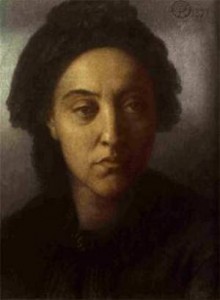
Christina Georgina Rossetti
(1830-1894)
The Wind
Who has seen the wind?
Neither I nor you;
But when the leaves hang trembling
The wind is passing through.
Who has seen the wind?
Neither you nor I;
But when the trees bow down their heads
The wind is passing by.
Christina Georgina Rossetti poetry
fleursdumal.nl magazine
More in: Archive Q-R, Rossetti, Christina
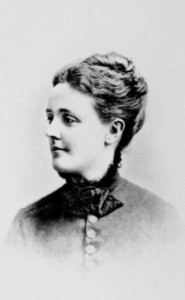
(Theodora) Sarah Orne Jewett
(1849-1909)
Missing
You walked beside me, quick and free;
With lingering touch you grasped my hand;
Your eyes looked laughingly in mine;
And now ? I can not understand.
I long for you, I mourn for you,
Through all the dark and lonely hours.
Heavy the weight the pallmen lift,
And cover silently with flowers.
Sarah Orne Jewett poetry
fleursdumal.nl magazine
More in: Archive I-J, CLASSIC POETRY
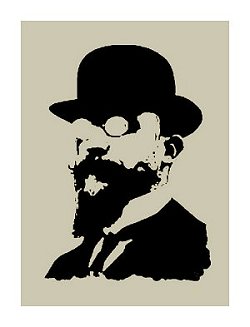
Erik Satie
(1866 – 1925)
Le Carnaval
Les confetti descendent !
Voici un masque mélancolique.
Un pierrot ivre fait le malin.
Arrivent de souples dominos.
On se bouscule pour les voir.
« Sont-elles jolies ? »
3 avril 1914
Erik Satie Le Carnaval
fleursdumal.nl magazine
More in: Archive S-T, Erik Satie, Satie, Erik
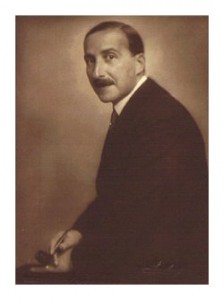
Stefan Zweig
(1881-1942)
Das Mädchen
Heut kann ich keine Ruhe finden …
Das muß die Sommernacht wohl sein.
Durchs off’ne Fenster strömt der Linden
Verträumter Blütenduft herein.
Oh Du mein Herz, wenn er jetzt käme
– Die Mutter ging schon längst zur Ruh –
Und Dich in seine Arme nähme …
Du schwaches Herz, … was tätest du? …
Stefan Zweig poetry
fleursdumal.nl magazine
More in: Archive Y-Z, Stefan Zweig, Zweig, Stefan

Richard Lovelace
(1618-1657)
To Lucasta. The Rose
I.
Sweet serene skye-like flower,
Haste to adorn her bower;
From thy long clowdy bed
Shoot forth thy damaske head.
II.
New-startled blush of Flora!
The griefe of pale Aurora,
Who will contest no more,
Haste, haste, to strowe her floore.
III.
Vermilion ball, that’s given
From lip to lip in Heaven;
Loves couches cover-led,
Haste, haste, to make her bed.
IV.
Dear offspring of pleas’d Venus,
And jollie plumpe Silenus;
Haste, haste, to decke the haire,
Of th’ only sweetly faire.
V.
See! rosie is her bower,
Her floore is all this flower;
Her bed a rosie nest
By a bed of roses prest.
VI.
But early as she dresses,
Why fly you her bright tresses?
Ah! I have found, I feare;
Because her cheekes are neere.
Richard Lovelace poetry
fleursdumal.nl magazine
More in: Archive K-L, CLASSIC POETRY

Voltaire
(1694-1778)
À une dame ou soit-disant telle
Tu commences par me louer,
Tu veux finir par me connaître.
Tu me louras bien moins ; mais il faut t’avouer
Ce que je suis, ce que je voudrais être.
J’aurai vu dans trois ans passer quarante hivers ;
Apollon présidait un jour qui m’a vu naître ;
Au sortir du berceau j’ai bégayé des vers ;
Bientôt ce dieu puissant m’ouvrit son sanctuaire ;
Mon cœur, vaincu par lui, se rangea sous sa loi.
D’autres ont fait des vers par le désir d’en faire ;
Je fus poète malgré moi.
Tous les goûts à la fois sont entrés dans mon âme ;
Tout art a mon hommage, et tout plaisir m’enflamme :
La peinture me charme ; on me voit quelquefois,
Au palais de Philippe, ou dans celui des rois,
Sous les efforts de l’art admirer la nature,
Du brillant Cagliari saisir l’esprit divin,
Et dévorer des yeux la touche noble et sûre
De Raphaël et du Poussin.
De ces appartements qu’anime la peinture
Sur les pas du plaisir je vole à l’opéra.
J’applaudis tout ce qui me touche,
La fertilité de Campra,
La gaité de Mouret, les graces de Destouches :
Pélissier par son art, le Maure par sa voix,
Tour à tour ont mes vœux et suspendent mon choix.
Quelquefois, embrassant la science hardie
Que la curiosité
Honora par vanité
Du nom de philosophie,
Je cours après Newton dans l’abyme des cieux ;
Je veux voir si des nuits la courrière inégale,
Par le pouvoir changeant d’une force centrale,
En gravitant vers nous s’approche de nos yeux,
Et pèse d’autant plus qu’elle est près de ces lieux
Dans les limites d’un ovale.
J’en entends raisonner les plus profonds esprits,
Maupertuis et Clairault, calculante cabale ;
Je les vois qui des cieux franchissent l’intervalle,
Et je vois trop souvent que j’ai très peu compris.
De ces obscurités je passe à la morale ;
Je lis au cœur de l’homme, et souvent j’en rougis ;
J’examine avec soin les informes écrits,
Les monuments épars, et le style énergique
De ce fameux Pascal, ce dévot satirique ;
Je vois ce rare esprit trop prompt à s’enflammer ;
Je combats ses rigueurs extrêmes :
Il enseigne aux humains à se haïr eux-mêmes ;
Je voudrais, malgré lui, leur apprendre à s’aimer.
Ainsi mes jours égaux, que les Muses remplissent,
Sans soins, sans passions, sans préjugés fâcheux,
Commencent avec joie, et vivement finissent
Par des soupers délicieux.
L’amour dans mes plaisirs ne mêle plus ses peines ;
La tardive raison vient de briser mes chaînes :
J’ai quitté prudemment ce dieu qui m’a quitté ;
J’ai passé l’heureux temps fait pour la volupté.
Est-il donc vrai, grands Dieux, il ne faut plus que j’aime ?
La foule des beaux arts, dont je veux tour à tour
Remplir le vide de moi-même,
N’est pas encore assez pour remplacer l’amour.
Voltaire poetry
fleursdumal.nl magazine
More in: Archive U-V, Voltaire

Velimir Chlebnikov
(1885-1922)
Когда умирают кони – дышат…
Когда умирают кони – дышат,
Когда умирают травы – сохнут,
Когда умирают солнца – они гаснут,
Когда умирают люди – поют песни.
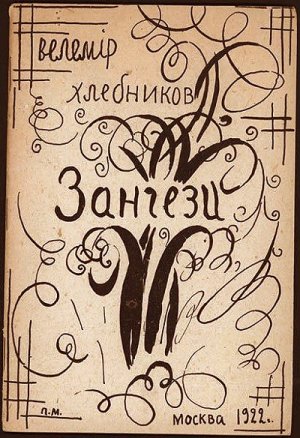
velimir chlebnikov poetry
fleursdumal.nl magazine
More in: Archive C-D, Chlebnikov, Velimir
Thank you for reading Fleurs du Mal - magazine for art & literature